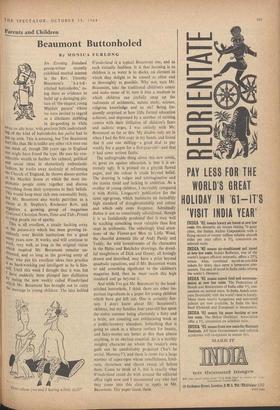Parents and Children
Beaumont Buttonholed
By MONICA FURLONG AN Evening Standard gossip-writer recently exhibited morbid interest in the Rev. Timothy Beaumont's '12 and- stitched buttonholes,' us- ing them as evidence to build up a damaging pic- ture of 'the elegant young Mayfair parson' whom we were invited to regard as a dilettante dabbling in do-gooding to while away an idle hour, with precious little understand- ing of the kind of buttonholes hoi polloi had to Put up with. This is amusing, but Tim Beaumont 'sal like that. He is unlike any other rich man one can think of, though 200 years ago in England One might have found, the type. He uses his con- siderable wealth to further his cultural, political and social ideas in shamelessly enthusiastic fashion, he works away tirelessly at reforming the Church of England, he throws dinner-parties at his Mayfair house at which the most im- Probable people come together and discuss everything from their symptoms to their beliefs. This would keep most rich men reasonably busy, but Mr. Beaumont also works part-time as a curate at St. Stephen's, Rochester Row, and °r8anises a growing group of magazines (National Christian News, Time and Tide, Prism) t0 whip people out of apathy. This is all excellent, a steady hacking away (1! the poison-ivy which has been growing in- stdiusly over British institutions for a good nianY years now. It works, and will continue to Work, very well, so long as the original vision which inspired Mr. Beaumont remains un- diMmed, and so long as the growing army of those who put his excellent ideas into practice Is as hard-working and intelligent as he is him- !elf. Until this week I thought that it was, but have suddenly been plunged into disillusion by seeing the new weekly called Wonderland which Mr. Beaumont has brought out to carry the message to young children. The idea behind flow about you and 1 having a little idyll?' Wonderland is a typical Beaumont one, and as such virtually faultless. It is that learning is to children is as water is to ducks, an element in which they delight to be soused as often and as thoroughly as possible. Why not, says Mr. Beaumont, take the traditional children's comic and make more of it; turn it into a medium in which children can joyfully snap up the rudiments of arithmetic, nature study, science, religious knowledge and so on? Being fre- quently surprised at how little formal education achieves, and depressed by a number of existing comics with their titillation of children's fears and sadistic urges, I was entirely with Mr. Beaumont as far as this. My doubts only set in when I had the first copy in my hands, and found that it cost one shilling—a good deal to pay weekly for a paper for a five-year-old--and that it had some serious faults.
The unforgivable thing about this new comic, its great sin against education, is that it is ex- tremely ugly. It is printed on a greyish flawed paper, and the colour is crude beyond belief. The drawing is vulgar and unimaginative and the stories timid and lacking in ambition. As a mother Of young children, I inevitably compared it with Robin, Longacre's publication for the same age-group, which maintains an incredibly high standard of draughtsmanship and colour and which only costs fivepence. Admittedly Robin is not so consciously eduCational, though it is so fastidiously produced that it may well be teaching something more valuable than first steps in arithmetic. The unfailingly kind atten- tions of the Flower-pot Men to Little Weed, the cheerful domestic life of Andy Pandy and Teddy, the wild inventiveness of the characters in the Halas and Batchelor drawings, the dread- ful naughtiness of Dick and Danny, all lovingly drawn and described, may have a price beyond quadratic equations, and if Mr. Beaumont wants to add something significant to the children's magazine field, then he must leach this high standard and go beyond it.
And while I've got Mr. Beaumont by the hand- stitched buttonhole, I think there are other im- portant ingredients in a paper for young children which have got left out. One is certainly fan- tasy. I don't know about Mr. Beaumont's children, but my familiar four-year-old has spent the entire summer being alternately a fairy and a bride, not counting one exhilarating week as a public-lavatory attendant. Something that is going to catch at a bizarre instinct for beauty, and fairy-stories are better at this than almost anything, is an obvious essential. So is a terribly naughty character on whom the reader's own guilt can be comfortably projected ('Isn't he awful, Mummy?'), and there is room for a large number of super-egos whose unselfishness, kind- ness, cleverness and charm sweep all before them. Come to think of it, this is exactly what Wonderland could do with around the editorial office right now and 1 recommend any who feel they come into this class to apply to Mr. Beaumont. The paper needs them.






































 Previous page
Previous page